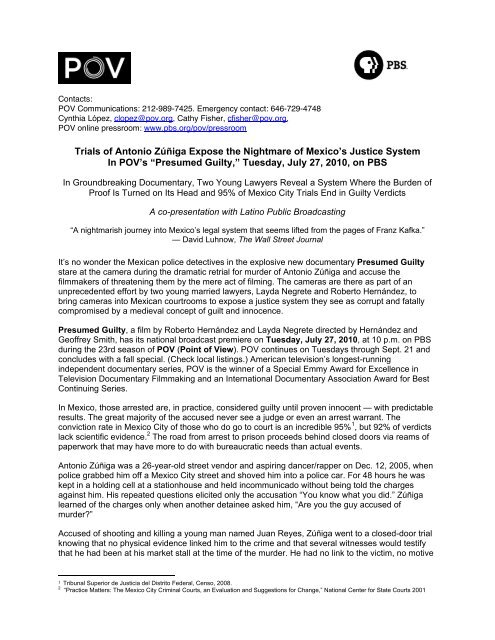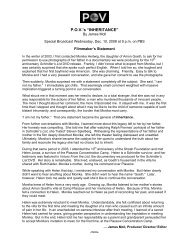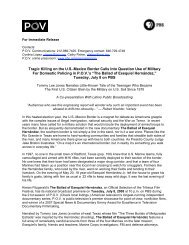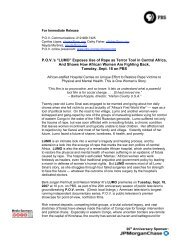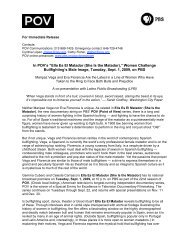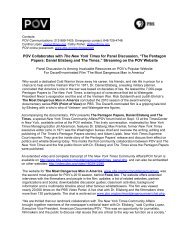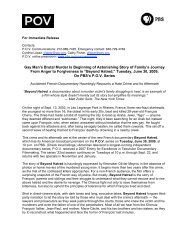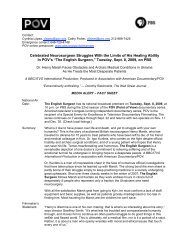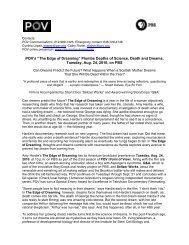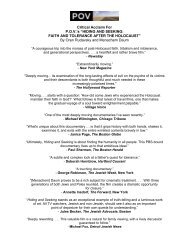POV - Presumed Guilty - Press Release - American Documentary, Inc.
POV - Presumed Guilty - Press Release - American Documentary, Inc.
POV - Presumed Guilty - Press Release - American Documentary, Inc.
- No tags were found...
You also want an ePaper? Increase the reach of your titles
YUMPU automatically turns print PDFs into web optimized ePapers that Google loves.
Contacts:<strong>POV</strong> Communications: 212-989-7425. Emergency contact: 646-729-4748Cynthia López, clopez@pov.org, Cathy Fisher, cfisher@pov.org,<strong>POV</strong> online pressroom: www.pbs.org/pov/pressroomTrials of Antonio Zúñiga Expose the Nightmare of Mexico’s Justice SystemIn <strong>POV</strong>’s “<strong>Presumed</strong> <strong>Guilty</strong>,” Tuesday, July 27, 2010, on PBSIn Groundbreaking <strong>Documentary</strong>, Two Young Lawyers Reveal a System Where the Burden ofProof Is Turned on Its Head and 95% of Mexico City Trials End in <strong>Guilty</strong> VerdictsA co-presentation with Latino Public Broadcasting“A nightmarish journey into Mexico’s legal system that seems lifted from the pages of Franz Kafka.”— David Luhnow, The Wall Street JournalIt’s no wonder the Mexican police detectives in the explosive new documentary <strong>Presumed</strong> <strong>Guilty</strong>stare at the camera during the dramatic retrial for murder of Antonio Zúñiga and accuse thefilmmakers of threatening them by the mere act of filming. The cameras are there as part of anunprecedented effort by two young married lawyers, Layda Negrete and Roberto Hernández, tobring cameras into Mexican courtrooms to expose a justice system they see as corrupt and fatallycompromised by a medieval concept of guilt and innocence.<strong>Presumed</strong> <strong>Guilty</strong>, a film by Roberto Hernández and Layda Negrete directed by Hernández andGeoffrey Smith, has its national broadcast premiere on Tuesday, July 27, 2010, at 10 p.m. on PBSduring the 23rd season of <strong>POV</strong> (Point of View). <strong>POV</strong> continues on Tuesdays through Sept. 21 andconcludes with a fall special. (Check local listings.) <strong>American</strong> television’s longest-runningindependent documentary series, <strong>POV</strong> is the winner of a Special Emmy Award for Excellence inTelevision <strong>Documentary</strong> Filmmaking and an International <strong>Documentary</strong> Association Award for BestContinuing Series.In Mexico, those arrested are, in practice, considered guilty until proven innocent — with predictableresults. The great majority of the accused never see a judge or even an arrest warrant. Theconviction rate in Mexico City of those who do go to court is an incredible 95% 1 , but 92% of verdictslack scientific evidence. 2 The road from arrest to prison proceeds behind closed doors via reams ofpaperwork that may have more to do with bureaucratic needs than actual events.Antonio Zúñiga was a 26-year-old street vendor and aspiring dancer/rapper on Dec. 12, 2005, whenpolice grabbed him off a Mexico City street and shoved him into a police car. For 48 hours he waskept in a holding cell at a stationhouse and held incommunicado without being told the chargesagainst him. His repeated questions elicited only the accusation “You know what you did.” Zúñigalearned of the charges only when another detainee asked him, “Are you the guy accused ofmurder?”Accused of shooting and killing a young man named Juan Reyes, Zúñiga went to a closed-door trialknowing that no physical evidence linked him to the crime and that several witnesses would testifythat he had been at his market stall at the time of the murder. He had no link to the victim, no motive1 Tribunal Superior de Justicia del Distrito Federal, Censo, 2008.2 “Practice Matters: The Mexico City Criminal Courts, an Evaluation and Suggestions for Change,” National Center for State Courts 2001
and no criminal history. The judge, Hector Palomares, found Zúñiga guilty and sentenced him to 20years behind bars.A young man’s sudden abduction off the streets of the capital is not unheard of in Mexico. Underintense pressure to solve rising crime, especially by drug gangs, police are sometimes suspected ofgrabbing and charging the first hapless person they come upon, often a poor person withoutresources for a defense. Once someone is arrested, everyone in the system, from police toprosecutor to judge to even the court-provided defense attorney, has every motivation to keep thedefendant in jail.The same year Zúñiga was arrested, Hernández and Negrete completed their first courtroomdocumentary, “El Túnel” (“The Tunnel”), a damning short that stirred debate about reformingMexico’s constitution to include presumption of innocence. “El Túnel” featured the case of Marco, ayoung man convicted of stealing a car even though the victim told detectives, prosecutors andjudges that the detainee was not the culprit. Marco’s release led Hernández and Negrete to launchLawyers with Cameras, their crusade to open the Mexican legal process to public scrutiny. It alsobrought a flood of requests for help, including a plea on behalf of the determined and eloquentZúñiga, whose case rested on a single eyewitness. But by the time Hernández and Negrete werecontacted, Zúñiga had lost his appeal and seemed doomed to spend 20 years in prison.Hernández and Negrete spent months filming in Iztapalapa, the neighborhood where Zúñiga lived, toverify his alibi. Given the difficulty of documenting cases of wrongful conviction in Mexico and thescarcity of journalistic work about such cases, the couple hoped to create a collection of researchedcases, including Zúñiga’s story, that would then be handed over to journalists. But things took anunexpected turn when, almost a year later, Hernández and Negrete made an unexpected discoveryat a Berkeley, Calif., law library. Their hunch that Zúñiga’s private defense lawyer had a forgedlicense turned out to be true. That meant that he had not been able to represent Zúñiga legally andthat they could apply for a retrial.A Mexico City appellate court voted unanimously to order a retrial. And another unlikely occurrenceensued: Hernández and Negrete obtained permission to film the new proceedings. In Mexico, aretrial does not mean that defendants get a fresh start, or a new jury. In fact, in the Mexican systemthere is no jury. So the same judge who had already convicted Zúñiga would retry him. Fortunately,this time around Hernández and Negrete enlisted a savvy defense attorney named Rafael Heredia— and cameras would be rolling.Zúñiga’s retrial, which lasted from November 2007 to February 2008, is the heart of <strong>Presumed</strong><strong>Guilty</strong>. To many <strong>American</strong>s, the courtroom scene will look unfamiliar, low-tech and surprisingly “inyour face.” Calm and determined, Zúñiga stands behind bars to present lawyer Heredia’s workduring the hearings. But soon he has to undertake a role he never imagined. Due to technicalities,his attorney is not allowed to ask even basic yes-or-no questions of any of the witnesses for theprosecution. In fact, the detectives can simply answer, “I do not remember,” and stand by their policereports. The lead detective reasons that if his agents arrested Zúñiga and he is behind bars, Zúñigamust be guilty.Zúñiga is also forced to cross-examine the original suspect and lone eyewitness accuser, VictorDaniel Reyes, a member of a gang allegedly involved in the shooting and the victim’s cousin. As thetwo stand almost nose-to-nose, Reyes sticks to his story. Then Zúñiga asks Reyes whether heknows that Zúñiga tested negative for gunpowder, as did Reyes. Matching Zúñiga’s slow anddeliberate pacing (for the benefit of the court typist), Reyes drops a bombshell: “I did not know thatthey did the same test that you now mention. And it is true I did not see who fired the gun.”During the closing statements, the prosecutor decides not to make any arguments, but instead tosubmit them on a floppy computer disc. The judge agrees to this. In a stunning exchange with theprosecutor, Zúñiga asks her to explain, in everyday language, her grounds for accusing him. The
answer would be laughable if it weren’t so tragic. “Why do I accuse him?” she says with a wan smile.“Because it’s my job.”No matter how obvious the injustice of Zúñiga’s conviction, the new verdict, rendered by JudgePalomares on Feb. 25, 2008, came back the same as the original one — guilty. Astoundingly, thetranscripts from the retrial simply restated the original trial’s judgment, dismissing any exoneratingevidence. Furthermore, only what the judge had dictated had been incorporated into the court’srecord. But there was another, incontrovertible record of the retrial — Hernández and Negrete’svideo footage.Ultimately, the video record convinced an appeals panel to free Zúñiga in April 2008 after 842 daysin jail. In September 2008, award-winning director Geoffrey Smith (The English Surgeon, <strong>POV</strong>2009) was asked to re-cut the film with Hernandez.Festival screenings of <strong>Presumed</strong> <strong>Guilty</strong> (Presunto Culpable in Spanish) have elicited tears andstanding ovations. Mexicans, who are aware of the dysfunction of their system, were still shocked bythe picture of the bald corruption, ineptitude and absurdity that pass for a trial in Mexico. The film willhave its theatrical release in Mexico this fall.<strong>Presumed</strong> <strong>Guilty</strong> is a seat-of-your-pants telling of one miscarriage of justice and what it took to fix it,and a startling challenge to the system that produced it. It is also a cautionary tale about what canhappen when police cross the line in the name of fighting crime, when power is exercised in theshadows and when the presumption of guilt is placed on the accused rather than the accuser.“This film also demonstrates that people can defeat overwhelming odds when they trust and supporteach other,” says director Hernández. “Antonio had the courage to trust two young and relativelyprivileged Mexicans with his fate. And in turn, the filmmaking process brought an unexpectedmeaning to his ordeal: the promise that everyone could see this farcical legal system for what it is.”Though gratified by the film’s role in freeing Zúñiga, Hernández notes, “It’s an expensive way to fixinjustice in Mexico. Our hope is to pass a law requiring every interrogation and every criminal trial inMexico to be videotaped.”Producer Negrete adds, “So many Mexicans believe that we have an <strong>American</strong> courtroom — that wewill have the prosecutor, the defense, the judge and the trial. They believe that! Because they havenever been in contact with a trial.”“This is a David and Goliath story of two people who took on a system,” says co-director Smith. “It’sbeautiful and so heartfelt. At screenings, you can see the righteous indignation. People are angry,but they also want to channel that anger and do something about it.”<strong>Presumed</strong> <strong>Guilty</strong> is a production of Lawyers with Cameras in co-production with IMCINE andFOPROCINE.About the Filmmakers:Roberto Hernández (Director/Producer)Roberto Hernández was trained as a lawyer in Mexico and Canada and had no particular interest incameras or film until he found himself collecting statistics in the basement of Mexico City’s SuperiorCourt, which houses the archived legal cases of one of the largest cities in the world. What he sawinspired him and his wife, Layda Negrete, to make “El Túnel,” a short documentary that presentedscandalous facts about Mexico’s justice system and was broadcast on several television stationsthroughout Mexico. As a result of the support the film received, in 2008 Mexico’s Congress passedthe most significant amendment to its constitution’s due process clause, requiring public trials andthe presumption of innocence. But Hernández, currently a graduate student in public policy at theUniversity of California, Berkeley, notes, “The implementation of this reform is hardly progressing at
all, as the Mexican government today remains ostensibly focused on an offensive against drugcartels.”In June 2006, the desperate friends and relatives of an inmate read about “El Túnel” and contactedHernández and Negrete, pleading for help. The experience of filmmaking was fresh in Hernández’mind, and it seemed natural for him to record that first meeting. Thus began a two-year productionadventure that resulted in <strong>Presumed</strong> <strong>Guilty</strong>, a story that changed the young couple’s lives.Layda Negrete (Producer)Layda Negrete is a lawyer with more than 10 years of experience conducting research on thecriminal justice system across Mexico, her country of birth. Her research has been funded by theHewlett Foundation, the United Nations Office of the High Commissioner for Human Rights and theWorld Bank. She has designed and conducted surveys for inmates in the states of the FederalDistrict (DF), Mexico, Morelos and Oaxaca and has helped design and administer victimizationsurveys in Mexico City. Negrete is currently a graduate student in public policy at the University ofCalifornia, Berkeley.Geoffrey Smith (Co-Director)Born in Melbourne, Australia, Geoffrey Smith began traveling early, discovering a twin love formovies and storytelling along the way. In 1987 he found himself in Haiti, helping to make adocumentary about the country’s first election in 31 years. Following the discovery of a massacre of21 voters in a schoolyard, Smith was himself shot and wounded. After struggling to recover inLondon, he decided to go back to Haiti to find the man who had nearly killed him — and to film thewhole thing. The resulting film, “Searching for a Killer,” won wide acclaim and was aired on the BBC.Smith discovered that the camera can be a powerful, cathartic tool that helps people through difficultperiods and went on to build his subsequent work around that concept.The winner of numerous awards, Smith has made more than 22 films and has worked for all themajor U.K. broadcasters. His <strong>POV</strong> film The English Surgeon, about neurosurgeon Dr. Henry Marshand his work in Ukraine, won a Christopher Award and Best International Feature <strong>Documentary</strong>awards at the Hot Docs Canadian International <strong>Documentary</strong> Festival and SILVERDOCS.Credits:Directors:Producers:Cinematographers:Editors:Original Music:Roberto Hernández, Geoffrey SmithRoberto Hernández, Layda Negrete, Martha Sosa, Yissel IbarraJohn Grillo, Amir Galvan, Luis Damian Sanchez, Lorenzo HagermanFelipe Gomez, Roberto HernándezCamilo Froideval, Raúl VizziRunning Time: 56:46<strong>POV</strong> Series Credits:Executive Producer:Executive Vice President:Simon KilmurryCynthia LópezAwards & Festivals:• San Francisco International Film Festival, 2010 – Golden Gate Best Bay Area <strong>Documentary</strong>• East End Film Festival, London, 2010 – Best Feature <strong>Documentary</strong> Award• Guadalajara International Film Festival, 2010 – Best <strong>Documentary</strong> Award• DocumentaMadrid, 2010 – Best <strong>Documentary</strong> Award and Audience Award• Copenhagen International <strong>Documentary</strong> Film Festival, 2009 – Amnesty International Award• Morelia International Film Festival, 2009 – Best <strong>Documentary</strong> Award• Human Rights Watch Film Festival, 2010 – Closing Night Film• Sarajevo Film Festival, 2010• Los Angeles Film Festival, 2010• SILVERDOCS, 2010
• International Human Rights Film Festival, México City, 2010• SXSW Film Festival, Austin, Texas, 2010• DocPoint Helsinki, Finland, 2010• Cartagena International Film Festival, Colombia, 2010(For a complete list of festivals, go to www.presumedguiltythemovie.com.)Created in 1998 by Edward James Olmos and Marlene Dermer, Latino Public Broadcasting(LPB) is a nonprofit organization funded by the Corporation for Public Broadcasting. LPB’smission is to support the development, production, post-production, acquisition anddistribution of non-commercial educational and cultural television that is representative of oraddresses issues of particular interest to U.S. Latinos. These programs are produced fordissemination to public broadcasting stations and other public telecommunications entities. Olmos is presentlyLPB’s Chairman of the Board of Directors. For more information please visit www.lpbp.org.Produced by <strong>American</strong> <strong>Documentary</strong>, <strong>Inc</strong>. and now in its 23rd season on PBS, the awardwinning<strong>POV</strong> series is the longest-running showcase on <strong>American</strong> television to feature thework of today’s best independent documentary filmmakers. Airing June through September,with primetime specials during the year, <strong>POV</strong> has brought more than 300 acclaimed documentaries to millionsnationwide and has a Webby Award-winning online series, <strong>POV</strong>'s Borders. Since 1988, <strong>POV</strong> has pioneered theart of presentation and outreach using independent nonfiction media to build new communities in conversationabout today's most pressing social issues. More information is available at www.pbs.org/pov.<strong>POV</strong> Interactive (www.pbs.org/pov)<strong>POV</strong>’s award-winning Web department produces special features for every <strong>POV</strong> presentation, extending thelife of our films through filmmaker interviews, story updates, podcasts, streaming video and community-basedand educational content that involves viewers in activities and feedback. <strong>POV</strong> Interactive also produces ourWeb-only showcase for interactive storytelling, <strong>POV</strong>’s Borders. In addition, the <strong>POV</strong> Blog is a gathering placefor documentary fans and filmmakers to discuss and debate their favorite films, get the latest news and link tofurther resources. The <strong>POV</strong> website, blog and film archives form a unique and extensive online resource fordocumentary storytelling.<strong>POV</strong> Community Engagement and Education<strong>POV</strong> works with local PBS stations, educators and community organizations to present free screenings anddiscussion events to inspire and engage communities in vital conversations about our world. As a leadingprovider of quality nonfiction programming for use in public life, <strong>POV</strong> offers an extensive menu of resources,including free discussion guides and curriculum-based lesson plans. In addition, <strong>POV</strong>’s Youth Views works withyouth organizers and students to provide them with resources and training so they may use independentdocumentaries as a catalyst for social change.Major funding for <strong>POV</strong> is provided by PBS, The John D. and Catherine T. MacArthur Foundation, NationalEndowment for the Arts, The Educational Foundation of America, New York State Council on the Arts, NewYork City Department of Cultural Affairs, The Fledgling Fund, FACT and public television viewers. Funding for<strong>POV</strong>'s Diverse Voices Project is provided by the Corporation for Public Broadcasting, The Andy WarholFoundation for the Visual Arts and the Rockefeller Brothers Fund. Special support provided by the Academy ofMotion Picture Arts and Sciences. <strong>POV</strong> is presented by a consortium of public television stations, includingKCET Los Angeles, WGBH Boston and THIRTEEN in association with WNET.ORG.<strong>American</strong> <strong>Documentary</strong>, <strong>Inc</strong>. (www.amdoc.org)<strong>American</strong> <strong>Documentary</strong>, <strong>Inc</strong>. (AmDoc) is a multimedia company dedicated to creating, identifying andpresenting contemporary stories that express opinions and perspectives rarely featured in mainstream mediaoutlets. AmDoc is a catalyst for public culture, developing collaborative strategic engagement activities aroundsocially relevant content on television, online and in community settings. These activities are designed totrigger action, from dialogue and feedback to educational opportunities and community participation.Media Sponsor:


